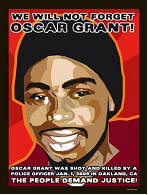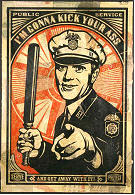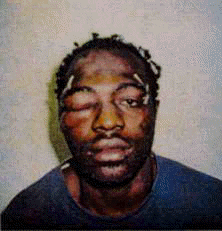 October 22nd is a day of action and events to Stop Police Brutality, Repression and the Criminalization of a Generation. The October 22nd coalition was formed in 1996 in response to acts of police aggression. The about section of the Coalition’s website, www.october22.org explains the significance of the date.
October 22nd is a day of action and events to Stop Police Brutality, Repression and the Criminalization of a Generation. The October 22nd coalition was formed in 1996 in response to acts of police aggression. The about section of the Coalition’s website, www.october22.org explains the significance of the date.
“October 22nd was the negotiated date for NDP (National Day of Protest) in 1996, the year that it started. The groups involved wanted to have it in October, because students would be back in school, and before the elections, so that people could have a way to express themselves in the streets. It did not have a significance in its own right. The first year was so successful that people said, "let's do it again!" October 22nd then became significant as the date on which people nationally protest police brutality.
 I have been blessed that I have never been a victim of police brutality. All of my encounters with the police have worked out fine. I have been arrested during an act of civil disobedience to bring the troops home from Iraq. I have to engage police during protests. There have been a few moments where a traffic stop could have turned negative, but I have always been able to read the officers and keep the moment from escalating into something ugly and still keep my respect as a citizen.
I appreciate the fact that police have difficult jobs. I will not hesitate to call the police if I feel reason. I was brought up in a lower middleclass one parent family by a mother who had an eye toward upward mobility for her children. Thus she taught us to respect police and think of them as an ally when there is trouble. She did not exactly teach us that all police are officer Friendly, but we were not taught to fear them either. Actually we were not taught to fear anything at all except her. But all my life the signals that police could be deadly and hurt me were there. I distinctly remember Ma Patty, my grandmother referring to the police as the bull. Anytime she saw the bull in the neighborhood she made us aware. As I got older and traveled I was warned by residence of various cities where it was safe to travel as a Black person and where I might likely be pulled over by the police for simply being myself in the car. This became known as driving while Black.
I have been blessed that I have never been a victim of police brutality. All of my encounters with the police have worked out fine. I have been arrested during an act of civil disobedience to bring the troops home from Iraq. I have to engage police during protests. There have been a few moments where a traffic stop could have turned negative, but I have always been able to read the officers and keep the moment from escalating into something ugly and still keep my respect as a citizen.
I appreciate the fact that police have difficult jobs. I will not hesitate to call the police if I feel reason. I was brought up in a lower middleclass one parent family by a mother who had an eye toward upward mobility for her children. Thus she taught us to respect police and think of them as an ally when there is trouble. She did not exactly teach us that all police are officer Friendly, but we were not taught to fear them either. Actually we were not taught to fear anything at all except her. But all my life the signals that police could be deadly and hurt me were there. I distinctly remember Ma Patty, my grandmother referring to the police as the bull. Anytime she saw the bull in the neighborhood she made us aware. As I got older and traveled I was warned by residence of various cities where it was safe to travel as a Black person and where I might likely be pulled over by the police for simply being myself in the car. This became known as driving while Black.

The BART Police shooting of Oscar Grant was a fatal shooting in Oakland, California, United States, in the early morning hours of New Year's Day 2009.
The colonial world is a world cut in two. The dividing line, the frontiers are shown by barracks and police stations. In the colonies it is the policeman and the soldier who are the official, instituted go-betweens, the spokesmen of the settler and his rule of oppression. In capitalist societies the educational system, whether lay or clerical, the structure of moral reflexes handed down from father to son, the exemplary honesty of workers who are given a medal after fifty years of good and loyal service, and the affection which springs from harmonious relations and good behavior--all these aesthetic expressions of respect for the established order serve to create around the exploited person an atmosphere of submission and of inhibition which lightens the task of policing considerably. In the capitalist countries a multitude of moral teachers, counselors and "bewilderers" separate the exploited from those in power. In the colonial countries, on the contrary, the policeman and the soldier, by their immediate presence and their frequent and direct action maintain contact with the native and advise him by means of rifle butts and napalm not to budge. It is obvious here that the agents of government speak the language of pure force. The intermediary does not lighten the oppression, nor seek to hide the domination; he shows them up and puts them into practice with the clear conscience of an upholder of the peace; yet he is the bringer of violence into the home and into the mind of the native.
The full quote gives great insight into the the use of State dominated socialization and State sanctioned violence to maintain order. The last sentence in particular illustrates the relationship between the police in their role as protectors of owners, their property and the status quo on one side and the poor, disenfranchised and those challenging the status quo in the name of justice on the other. The victims of police brutality tend to be those who are most vulnerable, communities who have been or are being exploited and persons challenging the system itself. I am part of an exploited community and those challenging the system. I also realize that the relationship is complex because most times the police are working class people who come from the same communities facing the brutality. For a time my life in some respects paralleled that of a police officer. I was once the soldier to which Fanon refers. I could have been a policeman. My intension is not to demonize the police. Some are bad, most are good people. Whatever the case may be, Police Brutality, Repression and the Criminalization of a Generation must stop. Good police must breakdown the Blue Wall of Silence. They sully their honor by allowing their duty to protect and serve be subservient to fraternity.
October 22nd is an important day, because it is a day of resistance to the abuse of power by the State at its most profane; the unrestrained use of violence and the taking of life. It is a great day to standup for justice.
My intension is not to demonize the police. Some are bad, most are good people. Whatever the case may be, Police Brutality, Repression and the Criminalization of a Generation must stop. Good police must breakdown the Blue Wall of Silence. They sully their honor by allowing their duty to protect and serve be subservient to fraternity.
October 22nd is an important day, because it is a day of resistance to the abuse of power by the State at its most profane; the unrestrained use of violence and the taking of life. It is a great day to standup for justice.








